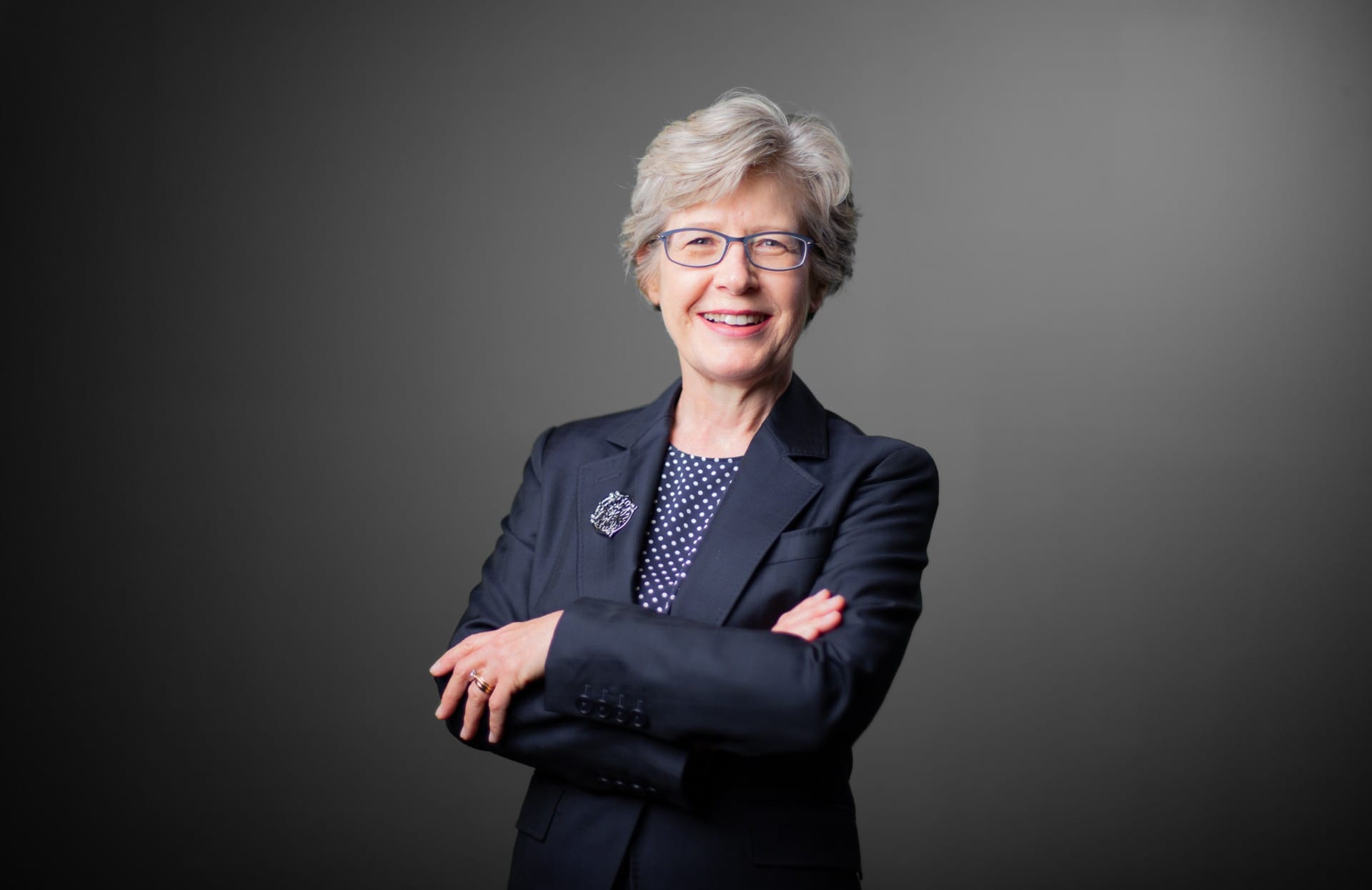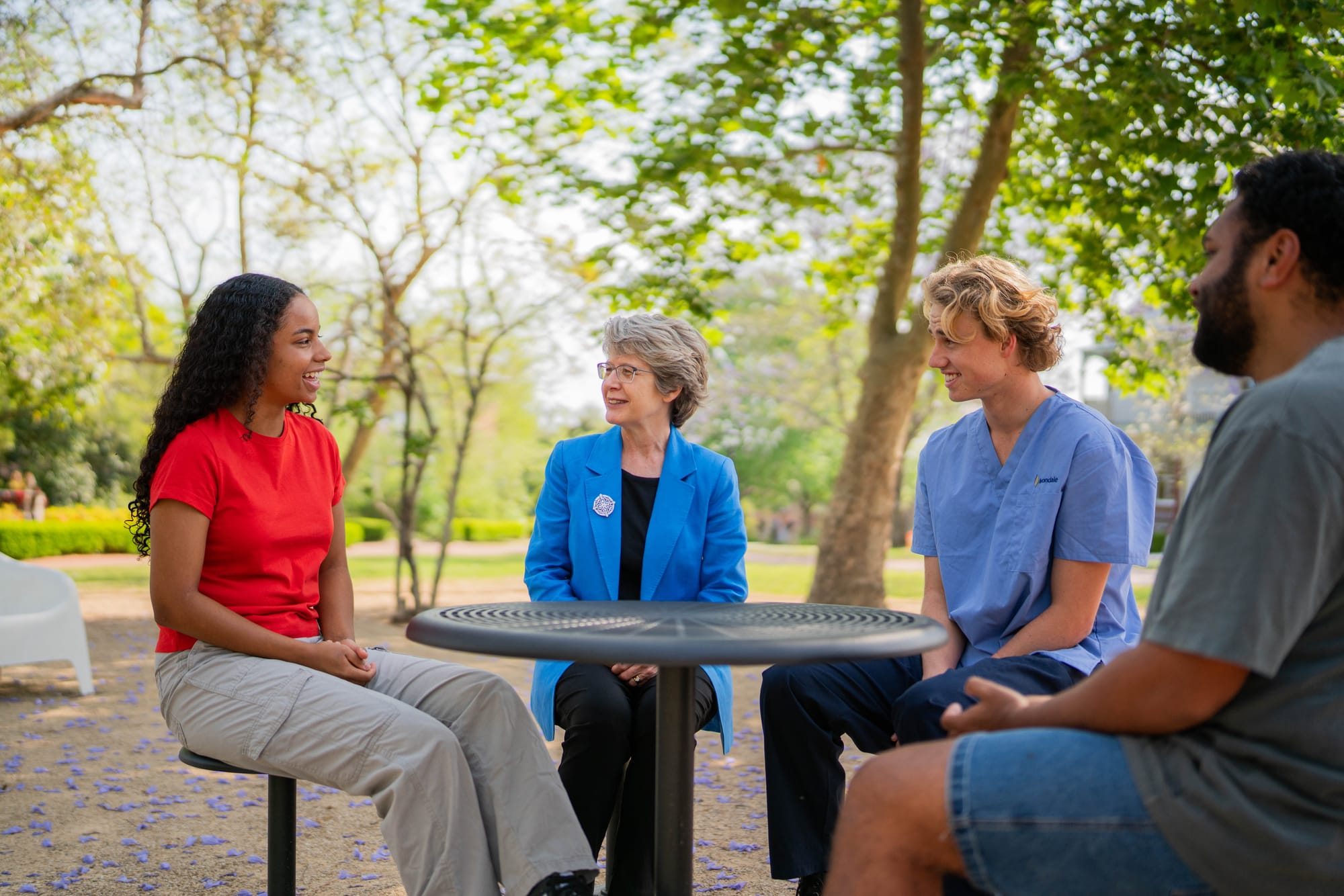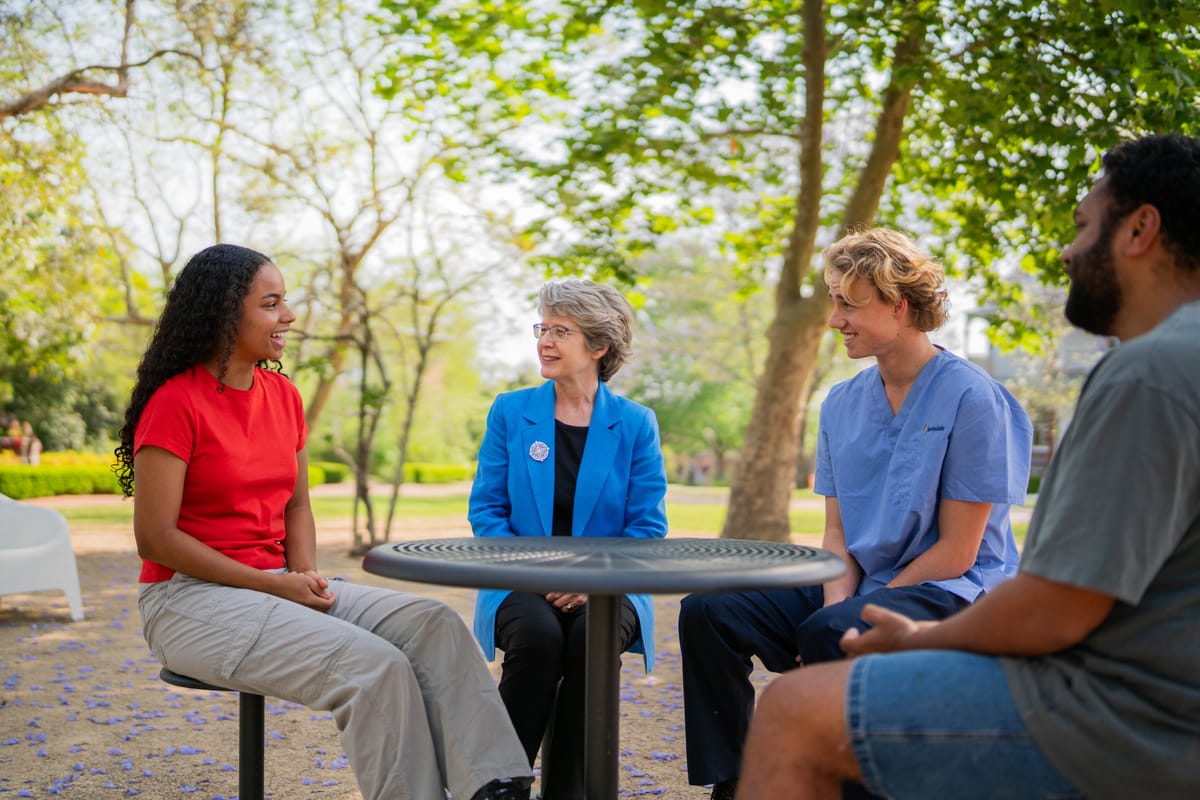Not many vice-chancellors can say they steered the creation of a new university. Professor Kerri-Lee Krause can. In this interview, we asked her to reflect on leading Avondale University and working alongside Research Strategies Australia.
Introduction
As Professor Krause completes her tenure at Avondale University, she can be proud of her legacy. Tim Cahill and the team at Research Strategies Australia are grateful to have supported her and her team on the remarkable journey from University College to becoming an Australian University. In this interview, she reflects on the last three and a half years.

Interview
Elsa Evers (Research Strategies Australia): Thank you for your time, Kerri-Lee. It sounds like it's the end of a chapter for you.
Professor Kerri-Lee Krause: I have worked in public universities for 30 years before I came to Avondale and I started at Avondale at the beginning of 2021 to support them in their preparation for submitting an application to become an Australian University.
Elsa Evers: Take me to talk about Avondale University itself, because I hadn't personally heard of Avondale University. I understand it's Australia's newest university. What makes it tick and why they decide to make that transition from a University College to a University?
Professor Kerri-Lee Krause: It's 127 years old and it was established specifically to provide post-secondary education at that time and it was owned by the Seventh-day Adventist Church. It was a group of people who belong to that faith who started the original Missionary College - as it was called then - and it remains owned by the Seventh-day Adventist Church. So, it is a faith-based institution and at the same time, it's open to anyone of any faith or no faith who wants to learn in an environment that is very focused on its mission of instilling a greater vision of world needs - basically looking at how graduates can support the needs of community, locally and globally.
It was originally designed to provide a holistic education, which is very current. Right now, the focus is on student well-being; so students learning in the classroom as well as out on the land, on the farm, and in the community. So it's hung on to that holistic focus, which is phenomenal really.
It originally began as a post-secondary training organisation focused on three priority areas: preparing graduates to work in the areas of teaching, preaching and nursing and has retained those three focus areas, obviously much more contemporary now, but our curriculum and research continue to focus on those three areas.
A little bit of background: since the 1950s, it's actually been offering undergraduate degree programs in partnership with external institutions and then moved through the various types of institutions that are part of the higher education (provider category) standards. So, it became a university college. And then it was eligible to apply for university status.
It's always been ambitious to be a distinctive type of higher education institution. It doesn't pretend to be a comprehensive university; it's very clear on who it is, what its focus areas are.
"The aspiration to become a university was very appealing for me just to see, you know, ‘can we actually add real differentiation in the higher education sector?’"
University status was granted in July, 2021. And so that makes it Australia's smallest university and Australia's newest university.
Elsa Evers: So it sounds like it was a gradual progression towards becoming a university, but I imagine that's still a very big leap from being a University College to a University and you've been at the helm for that. What is the major challenge in making that transition?
Professor Kerri-Lee Krause: Yes, it's a significant leap. For that reason, what the regulator says is that for an institution like Avondale that makes that big leap from University College to University, they actually allow a 10-year period of transition to gradually mature in terms of your research output. They expect that a university college will have robust quality assurance, excellent student outcomes, learning and teaching - top-notch, but the biggest challenge in making the leap is developing a comprehensive and sustained research outcome. And so for that reason, the regulator says we'll give you 10 years, but they expect, year on year, to see evidence of maturation, growth and performance.
"That is the reason why we signed Tim up to help us make that leap and to set the groundwork in place to be able to measure performance over that 10-year period."
Elsa Evers: How did you come across Tim? Why did you choose Research Strategies Australia over another consulting group?
Professor Kerri-Lee Krause: He came highly recommended. So as soon as Avondale became a university in mid 2021, it was clear to me that we would need support from external experts who could validate our performance as a university. Avondale… because it hasn't been a university, it has never participated in the benchmarking exercises that other universities do.
There are a number of things that make this transition a challenge, and that's one of them. You have no baseline data, and we needed that, and we couldn't suddenly participate in benchmarking exercises, so we needed an expert who understood the metrics. To help us to develop and engage in our own benchmarking exercise.
I contacted several of my colleagues in universities. I contacted a DVC Research who had a lot of experience and this person said: “Tim is the one I would recommend hands down.” So I made contact with Tim, had never heard of him, never spoken to him. And now, here we are three and a half years later.

Elsa Evers: So how did it work when you first got together? What were the sort of steps that he took you through?
Professor Kerri-Lee Krause: Well from the start, it was very much a partnership model.
He listened carefully. It was new territory for him as well. And I really appreciated that he was humble enough to say, this is new territory. He knows his area back to front and inside out. He's an expert, very clearly and known as such, but applying his expertise in this environment was a new experience.
"It was a great learning experience for both of us. I really appreciated his willing to partner and to co-design."
So very quickly, I involved him in meetings with my colleagues because a big part of this maturation is a culture shift. It's about building capability and bringing people with you.
It was fine for me to talk with him but the litmus test was: ‘how did he communicate with colleagues who needed to develop their skills?’ And I have to tell you, Elsa, my colleagues just loved his style. I got so many positive comments about his manner with staff who had limited experience of university operations. They had no reason to have those skills from day one, and he was clearly an expert, but their feedback to me was he never made them feel like they were ignorant or silly. There was never a silly question. And he really spent time getting to know the people and the research that we do and the character and ethos of the place.
"It's been an outstanding partnership."
Elsa Evers: Were there any road bumps on the way? Did things go as planned?
Professor Kerri-Lee Krause: It never really goes as planned, right? So that's the reality. I developed the high-level research strategy. There was a blueprint for Tim to work with and he then road-tested that. As a result of his input, our annual operating plan was much more fine-tuned.
We needed him to look at our aspirations - our goals - and to equip us with the data and the sources of data.
That was one of the big things: we just didn't have evidence of the impact of our research. We didn't have data on citation rates. How were others around the world using our research? We had very little detailed information. And so it was a step-by-step journey. Once we had the data, we used that iteratively to figure out, okay, well, where are our gaps and what do we need to do? It's not that anything went off the rails because we're very clear; we've got the boundaries around what needs to be delivered at five- and 10-year periods. But how we get there and where we focus have been key.
"So, it's not that anything has gone wrong, but there's been an incredible level of maturation. That's the journey. Yes, it's been tough at times. It always is in university land. But you know, staff genuinely have felt like they've had a friend and supporter in Tim. And at the same time, he made calls when things were not good enough or where there are gaps."
I really appreciated his honest assessment.
Elsa Evers: Is it too early to say that there has been some kind of impact apart from the citations, some kind of real impact in the community of the kind of research that you're working on at Avondale?
Professor Kerri-Lee Krause: It’s definitely not too early. In fact, evidence of the impact of our research is a really comprehensive impact and engagement report that Tim and his team prepared for us.
For a university like Avondale, where mission-aligned research is everything, where you don't have a large budget, and you don't do an enormous amount of research across a whole lot of disciplines, every piece of evidence of impact and community engagement matters. He worked with our three Research Centre Directors and looked closely at the research. He gathered evidence of impact, went to talk with stakeholders.
One of our staff has led a project in the South Pacific, where Avondale has a long history. She's just led a New Zealand government funded research study, working with communities who are affected by climate insecurity or climate change. Tuvalu is a great example, rising sea levels, communities and families who are displaced as a result of climate change. She went into some of these communities, in partnership with local communities, it was very much a human-centred design with researchers on the ground and listened to their stories. It will actually feed back into government policy.
So there's a strong link across the discipline areas, and that's one of the great things about Avondale; the interdisciplinarity that large universities find very difficult because they tend to work in silos. In a small institution everyone knows each other, they talk to each other, and as a result, the research meshes really well.
Elsa Evers: What do you think the long-term impact of the partnership between Avondale University and Research Strategies Australia will be beyond this transition period and then into the future?
Professor Kerri-Lee Krause: That's a great question. I'd say there are three key areas that he leaves as a legacy and a foundation to work on.
One is the emphasis on evidence. He's given us a baseline set of data that we can now use to build on. We didn't have that before. So that will stand us in good stead.
Secondly, he's focused on helping to develop systems that now underpin our work. And while that doesn't sound particularly exciting, it's essential. It's like the engine that runs the car. You don't always think about it. You don't always see it, but these systems - IT systems - are now integrated into our day-to-day operations. And it means that we can scale and grow because we've got the baseline foundation systems.
"He has given confidence to a group of people who have been doing a phenomenal job and just didn't know it."
The reports that he's left are not just reports that sit on a shelf. They actually drive planning for the next five- and 10-year period. So that's very powerful.
Elsa Evers: That's a big job. I mean, there aren't many vice-chancellors that get to do what you've done. Am I correct?
Professor Kerri-Lee Krause: Yes, you would be right. It's the first new university (under the current higher education standards). It's the only one that has gone through this particular journey since the Dawkins era.
Elsa Evers: Would you do it again?
Professor Kerri-Lee Krause: Absolutely. I love what I do. I love the higher education sector and what it stands for. I think being able to link your research to values and demonstrate what impact you're having on your community - that's what it's all about.
Elsa Evers: If you could do it again, what would you do differently?
Professor Kerri-Lee Krause: I wouldn't change anything, to be honest with you. It would be great to have more money to do the things that you'd like to do and, you know, more time. But the reality is that so much has been achieved. And we're able to be a case study for others to say, 'wow, you know, why don't we think about that?' I think that's really powerful. So building the plane as you fly it, Elsa, is an analogy that I use all the time in this job and that's basically what we've done. I wouldn't change a thing.
Elsa Evers: You must be very proud of yourself and the team. What are you most proud of?
Professor Kerri-Lee Krause: I'm most proud of the fact that if you were to talk with any of my colleagues - right across the university but if we just talk about research - they would say, 'look what we did'. Rather than 'look what Kerri-Lee did' or 'look what the DVC Research did'.
"Look what we did. It's been such a collaborative and team effort and they own it. They live it."
And they need to do that because they've got to keep producing. And I think that's what I'm most proud of.
Elsa Evers: That's an amazing legacy to leave behind. Would you work with Tim again, or Research Strategies Australia if you went to a different university or would you recommend him?
Professor Kerri-Lee Krause: Absolutely.
"He's incredibly emotionally intelligent, which goes a long way in this sector. And in this environment where there's a lot of stress, limited funds, huge diversity, I think he really offers something bespoke... the cookie cutter consultancy type approach is long gone."
I have really appreciated his integrity as well. That counts for an enormous amount. The skill and the integrity has gone hand in hand, and I would recommend him.
Elsa Evers: Thank you so much for your time, Kerri-Lee. I wish you all the best in your journey. It's been really nice to learn about Avondale University. It's really nice to hear that there's an institution out there like that.
This interview was recorded on June 6, 2024 and has been softly edited to reduce length. Thank you so much to Kerri-Lee for sharing her time and wisdom.

